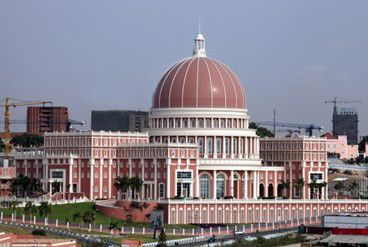Construction has always been at the core of the Teixeira Duarte Group’s business and remains its main activity. Today, the company operates across various areas – from geotechnics and infrastructure to metalworking, buildings, underground works, and railway construction. Its extensive international portfolio includes the National Assembly of Angola, the Bank of Mozambique, and the rehabilitation of the Hercílio Luz Bridge in Brazil.
Angola, Brazil and Mozambique are strategic markets for the Teixeira Duarte Group, although its construction arm is also active in other countries. Projects include infrastructure works in Cape Verde, underground developments in Spain and Peru, and railway construction in Gabon. This international presence is driven by a continued investment in innovative techniques and highly specialised human resources.
“Since its foundation in 1921, Teixeira Duarte has consistently positioned itself as an engineering house. The use of innovative construction techniques, highly specialised teams, and state-of-the-art proprietary equipment has enabled the company to deliver complex public and private projects – from bridges, dams and roads to hospitals and landmark buildings”, says Paulo Serradas, CEO of the Teixeira Duarte Group’s construction division.
Construction was the Group’s main growth driver in 2024, generating 436 million euros in sales and services. Domestic operations accounted for 236 million euros, while international markets contributed 200 million euros – representing 46 per cent of total construction revenue last year. The construction order book also grew by 43 per cent, reaching a total of 1.54 billion euros, with the high-speed rail project alone accounting for 26 per cent of this amount.
The Group has operated in Angola since 1976, making it one of its most important markets. “Over nearly 50 years of operations in the country, Teixeira Duarte has been responsible for building and rehabilitating key infrastructure such as the Cambambe and Gove dams, bridges, roads and more,” recalls Paulo Serradas. “In building construction, we highlight the National Assembly of Angola in Luanda, as well as the Sky Residence I and II and Sky Business buildings”. The company also built the Alvalade Hotel – the first hotel constructed in Angola after independence, still operating today under the TDHotels brand – and the Talatona Automotive Hub, opened in 2009 and operated by TDA.
In Mozambique, major projects include the Bank of Mozambique buildings in Maputo and the rehabilitation of the Port of Nacala. In Brazil, where Teixeira Duarte has been active for around 20 years, the portfolio includes the restoration of the Hercílio Luz Bridge in Santa Catarina, several dam projects, and the construction, renovation or expansion of multiple hospital facilities across the country.
The Group has also been developing initiatives in the areas of sustainability and digital transition. In 2024, it installed a solar energy self-consumption production unit (UPAC) at its Construction division's Operational Hub in Portugal. This installation helps avoid the emission of 823 tonnes of CO₂ per year and ensures the use of electricity from renewable sources. In its real estate activity, the Group is adopting sustainable construction methods and materials with a lower carbon footprint, aiming to reduce waste and embodied carbon in buildings. In the Facilities Management area, it has also launched installation and maintenance services for renewable energy systems – a segment that has seen a sharp rise in demand.
The digitalisation strategy has focused on consolidating Building Information Modeling (BIM) methodology, which enables the creation of accurate digital models to improve material planning, reduce waste, and optimise energy use, notes Paulo Serradas. “This approach not only reaffirms the company’s commitment to excellence, but also strengthens its ability to face new challenges anywhere in the world, proving its readiness to operate globally with efficiency and innovation.”
The Group includes specialised companies such as SOMAFEL – active in all areas of railway engineering and construction – and EPOS, a leader in large-scale underground works. “EPOS and SOMAFEL serve their own clients and projects. The need to meet highly specific and demanding technical requirements has endowed these companies with distinctive technical and technological capabilities”, adds Paulo Serradas.
Project development always depends on the specific characteristics of each market. In Angola, Teixeira Duarte – Engenharia e Construções aims to expand operations in line with its technical capacity and strong track record in the country. In Brazil, the focus is on growing the client base. “In Mozambique, despite the socio-economic challenges of recent years, we firmly believe Teixeira Duarte has a valuable role to play in the country’s next development cycle – one that its people truly deserve”, says Serradas. Lastly, in Cape Verde, the Group is finalising the first phase of the expansion and modernisation of seven airports. “This is a market where the Group has achieved excellent integration and intends to continue growing and expanding its construction activity.”




